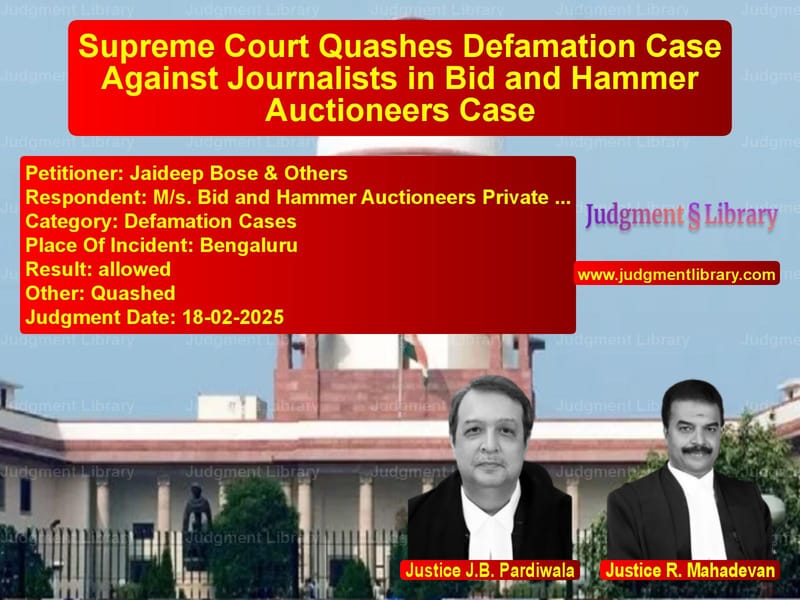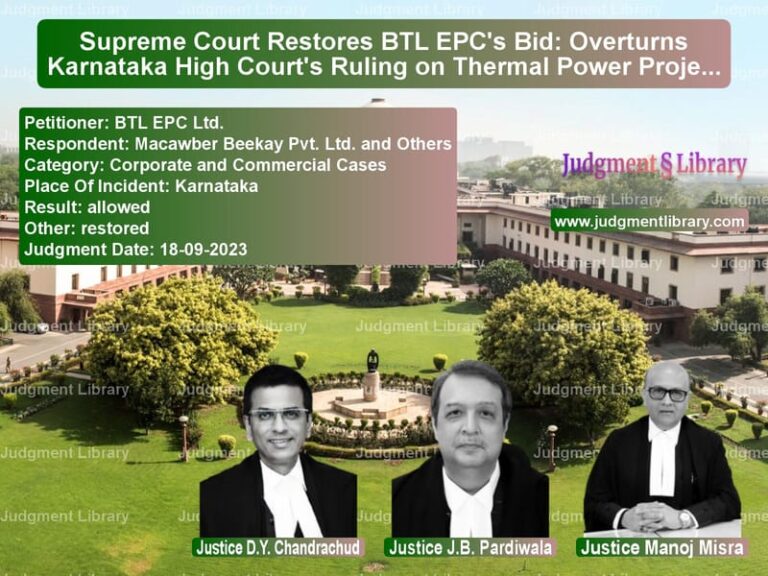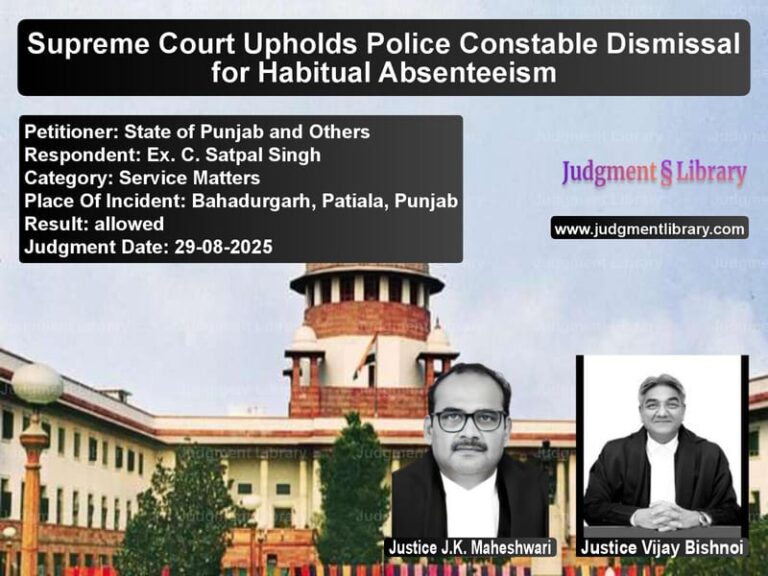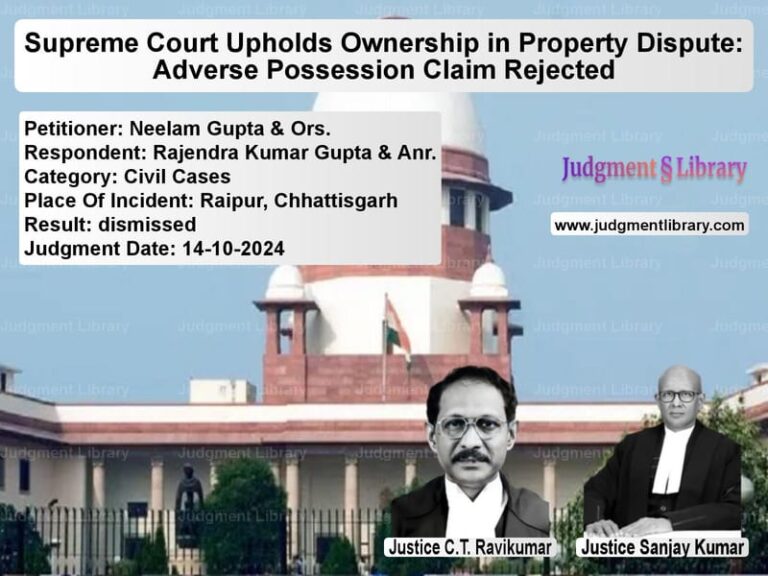Supreme Court Quashes Defamation Case Against Journalists in Bid and Hammer Auctioneers Case
The Supreme Court of India, in its judgment on February 18, 2025, ruled in favor of multiple journalists and media personnel accused of defamation by M/s. Bid and Hammer Auctioneers Private Limited. The Court quashed the criminal proceedings initiated against them under Sections 499 and 500 of the Indian Penal Code (IPC), emphasizing the necessity of due process in defamation cases and the significance of journalistic freedom.
Background of the Case
The dispute originated from a series of news articles published in various newspapers, including the Times of India, Economic Times, and Bangalore Mirror, between June and July 2014. These articles questioned the authenticity of paintings being auctioned by M/s. Bid and Hammer Auctioneers Private Limited, sparking controversy in the art market.
The complainant alleged that these reports caused significant reputational damage, leading them to file a criminal defamation complaint against 14 accused persons, including editorial directors, journalists, and editors. The case was registered as PCR No. 13146/2014 and later as CC No. 18491/2016 in the II Additional Chief Metropolitan Magistrate’s Court, Bengaluru.
Petitioners’ Arguments
The petitioners, including prominent journalists, challenged the initiation of criminal proceedings, arguing:
- They were not directly responsible for the publication of the articles.
- Some articles were based on pre-existing public discussions and expert opinions.
- The magistrate failed to follow the mandatory procedure under Section 202 of the Code of Criminal Procedure (Cr.P.C.), which requires an inquiry before summoning accused persons residing outside the court’s jurisdiction.
- The news articles were published in the public interest and did not constitute defamation.
The petitioners contended that the lower courts had erroneously presumed their liability without proper examination of the content of the articles.
Respondent’s Arguments
The complainant, M/s. Bid and Hammer Auctioneers Private Limited, asserted that the articles were deliberately designed to harm their reputation and diminish trust in their business. They argued that:
Read also: https://judgmentlibrary.com/supreme-court-quashes-fir-against-college-romance-creators-under-it-act/
- The accused had published misleading information about the authenticity of the paintings.
- The journalists did not verify facts before publication.
- The widespread circulation of these articles had caused irreparable harm to their credibility.
- Journalists cannot be exempt from defamation laws if their reporting is malicious and unfounded.
The complainant maintained that the articles created an impression that they were dealing in counterfeit artworks, leading to a loss of business opportunities.
Supreme Court’s Observations
The Supreme Court extensively analyzed the arguments and legal precedents surrounding defamation and press freedom. It noted that:
“Freedom of the press is fundamental to a democratic society. However, this freedom must be exercised with responsibility and in accordance with the law.”
The Court observed that the articles in question primarily reported the opinions of art experts and critics, without making direct allegations against the complainant.
On the issue of procedural irregularity, the Court emphasized:
“Section 202 Cr.P.C. mandates an inquiry before issuing process against an accused residing outside the magistrate’s jurisdiction. In this case, the trial court failed to conduct such an inquiry, rendering the summoning order legally untenable.”
The Court also highlighted the lack of specific allegations against some of the accused:
“Mere designation as an editorial director does not automatically confer liability. The complainant must establish direct involvement in the alleged defamatory publication.”
Supreme Court’s Final Ruling
After examining all aspects, the Supreme Court ruled:
“The summoning order and subsequent proceedings are quashed. The complaint fails to meet the legal standards required for prosecuting defamation under Sections 499 and 500 IPC.”
The Court stressed that journalistic responsibility must be balanced with the right to free expression and public interest reporting.
Impact of the Judgment
The verdict sets an important precedent for press freedom in India, reaffirming that defamation laws should not be misused to suppress critical journalism. It also underscores the necessity for courts to strictly follow procedural safeguards before initiating criminal proceedings in defamation cases.
The ruling provides clarity on the legal obligations of journalists and media houses while ensuring that defamation claims are adjudicated with due diligence.
Conclusion
The Supreme Court’s decision reinforces the principles of free speech, due process, and responsible journalism. By quashing the defamation case, the Court has upheld the right of the press to report on matters of public interest, provided it adheres to journalistic ethics and legal standards. The judgment serves as a landmark ruling in balancing media freedom with reputational rights.
Petitioner Name: Jaideep Bose & Others.Respondent Name: M/s. Bid and Hammer Auctioneers Private Limited.Judgment By: Justice J.B. Pardiwala, Justice R. Mahadevan.Place Of Incident: Bengaluru.Judgment Date: 18-02-2025.
Don’t miss out on the full details! Download the complete judgment in PDF format below and gain valuable insights instantly!
Download Judgment: jaideep-bose-&-other-vs-ms.-bid-and-hammer-supreme-court-of-india-judgment-dated-18-02-2025.pdf
Directly Download Judgment: Directly download this Judgment
See all petitions in Civil Defamation
See all petitions in Criminal Defamation
See all petitions in Judgment by J.B. Pardiwala
See all petitions in Judgment by R. Mahadevan
See all petitions in allowed
See all petitions in Quashed
See all petitions in supreme court of India judgments February 2025
See all petitions in 2025 judgments
See all posts in Defamation Cases Category
See all allowed petitions in Defamation Cases Category
See all Dismissed petitions in Defamation Cases Category
See all partially allowed petitions in Defamation Cases Category







